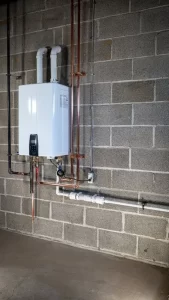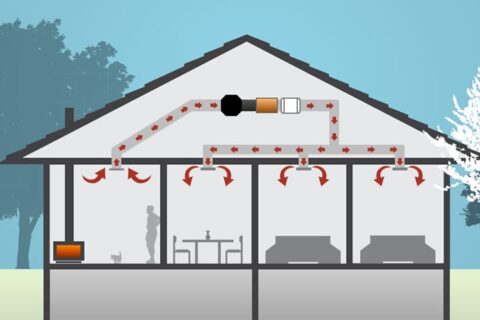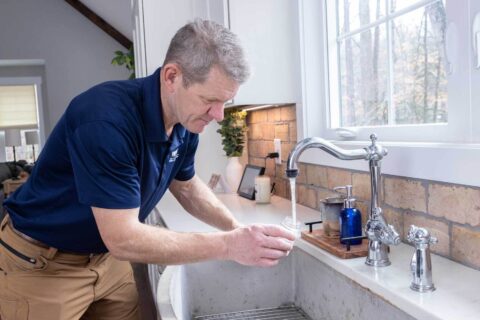How to Maximize the Lifespan of Your Tankless Water Heater?
Key Takeaways
-
Flushing the system regularly and cleaning the water filter keeps minerals from clogging the system and guarantees proper operation.
-
Regularly monitoring the quality of your water supply and installing a water softener where appropriate will help protect your unit from hard water damage.
-
Don’t overload the unit Along with effectively managing hot water demand, schedule an annual professional servicing to ensure the unit continues to run efficiently.
-
Having the unit installed properly by a qualified technician helps make sure the system works as intended and prevents premature wear and tear.
-
Look out for red flags. Be on the lookout for decreased water pressure, inconsistent temperatures, or strange sounds so you can address problems before they start.
-
Select a high-quality brand and model constructed for a long life. It will go a long way in extending the lifespan of your tankless water heater.
Tankless water heaters are favored for their efficiency and space-saving design, making them an ideal option for many homes. To ensure they continue working efficiently for decades, routine maintenance and care are absolutely crucial.
Regularly flushing the system clears out any mineral deposits. Ensuring the filter is clean and the water pressure is optimal can go a long way. Installing a water softener where hard water has caused scale build-up can lessen the strain on your system.
By implementing these practices, agencies can maintain improved performance while reducing long-term repair costs. When you stay on top of their maintenance, tankless water heaters provide a constant supply of hot water on demand.
It’s this reliability that guarantees they’ll keep your home comfortable for years to come.
What Affects Tankless Water Heater Lifespan
Water quality and mineral content
Whatever the overall quality of your water source, it has a major impact on your tankless water heater lifespan. Hard water, water that has a high mineral content, can lead to sediment buildup inside the heater over time. This mineral buildup puts additional strain on the system, making it harder to maintain optimal efficiency and longevity.
As the United States Environmental Protection Agency points out, soil erosion often leads to sediment problems. This issue is endemic across much of the country. Routine maintenance, such as yearly flushing of the system, can aid in clearing these deposits.
A Rusco filter is one type of sediment filter that gives additional protection to your unit. By removing impurities, it prevents them from damaging the system. Taking these steps increases energy efficiency, saves you money and helps your heater run better for longer. If you do, you’ll be saving tons of money on repair and energy costs down the line.
Frequency of usage
The more you use your tankless water heater, the quicker wear and tear occurs. Taking advantage of the unit by requiring more hot water than it can provide in a given period will cause a decline in performance. Flush the system on a regular basis to remove accumulated minerals and prevent damage.
Secondly, regularly clean the water filter to avoid clogging. If you live in an area with hard water, reducing the effects of hard water by installing a water softener is worthwhile. Scheduling annual maintenance by a professional tankless plumber is another way to help catch problems early and maintain long-term reliability.
Therefore, being smart about hot water demand will avoid overworking the heater and will help it last longer.
Installation and setup quality
Even the highest quality tankless water heater on the market won’t last long if it’s poorly installed. Incorrect installation could lead to leaks, clogs or fluctuating water temperature. For instance, inconsistent water temperatures can indicate a problem with the heating element or thermostat.
Lowered water pressure may be a sign of clogs, and higher energy bills can be a sign that your system is not operating efficiently. Monitoring for signs like strange sounds or external rust can put you on alert for tankless water heater failure before it occurs.
Having a unit that’s installed properly by a professional is key to steering clear of these issues.
Maintenance and servicing frequency
Performing routine maintenance has a direct effect on the lifespan of your tankless water heater. Regular maintenance can keep premature wear and tear from creating costly malfunctions and keep the unit running smoothly and efficiently.
A properly maintained heater may last up to 30 years, whereas one that is neglected may only last 12 years. Regular maintenance prevents waste, helping you protect the planet and enjoy peace of mind knowing you’ll always have hot water when you need it.
With a commitment to regular maintenance, you’re getting the most value for your system’s performance and extending the time before a costly replacement is necessary.
Type and brand of unit
The type and brand of your tankless water heater play a role, too. Units that use stainless steel heat exchangers frequently last much longer, usually 25 to 30 years. Tankless water heaters with copper heat exchangers tend to last only 12 to 20 years.
Brands known for high quality, such as Noritz and Navien, offer sophisticated features. Among these are smart technology and exceptional energy efficiency, with some models reaching 98% efficiency.
These alternatives may have more expensive upfront costs. Given their durability and efficiency, tankless water heaters provide long-term savings, which makes them a savvy investment.
Importance of Regular Maintenance
Prevents Costly Repairs
With costly repairs often outweighing regular maintenance costs, maintenance is one of the simplest ways to keep your budget in check. In time, hard water mineral deposits may start to form inside your tankless water heater. These deposits can choke the system, create undue stress on components, and cause catastrophic failures.
Regularly flushing the system at least once per year removes these deposits, preventing them from damaging your system. Over time, if flushing is not done, the heat exchanger can become overheated and do a catastrophic failure. Returning it would cost you hundreds of dollars.
Regularly cleaning the filters prevents debris from getting stuck and blocking the flow of water or screen. When you identify minor concerns early through regular maintenance inspections, you’re able to prevent bigger, more expensive problems later on.
Enhances Energy Efficiency
A clean, well-maintained unit uses less energy to heat the same amount of water. A mineral buildup inside the system can make it work harder, increasing your energy bills. Proper venting is an important factor to efficiency.
When vents are clogged or dirty, the system cannot adequately expel exhaust gases, causing energy to be wasted. Descaling the system on a regular basis is important so heat can transfer efficiently. Cleaning or replacing clogged filters allows water to pass through freely.
Taking these basic measures can add up to significant savings in the long run by reducing your monthly utility expenses.
Improves Overall Performance
Regular maintenance will keep your tankless water heater operating in peak condition, giving you access to hot water for years to come. By examining critical parts, such as the burner and heat exchanger, you can make no-worry repairs to prevent wear-and-tear from zapping performance.
With the right kind of regular care, many systems can last well beyond 20 years. By comparison, tank-style heaters only last on average 8 to 12 years.
How to Extend the Lifespan of Your Tankless Water Heater
1. Flush the system regularly
Minerals like calcium and magnesium build up in your tankless water heater, constricting it over time. This is especially true in regions with hard water. This sediment accumulation can clog the system, decrease heating efficiency, and ultimately, decrease its lifespan.
Flushing the system at least once a year with a specific cleaning solution, such as white vinegar, will help eliminate these deposits. For instance, if you start to notice issues like inconsistent water temperatures or water pressure, it may be due to a tankless buildup and it’s time to flush.
With regular annual flushing, you can enjoy years more hot water, more consistent, reliable hot water.
2. Clean the water filter
Most tankless water heaters include a rudimentary practice of a small water filter that will capture dirt and other small debris. With time this filter can become clogged, restricting water flow and putting unnecessary strain on the unit.
Cleaning it every few months will keep it running efficiently for years to come. If you’re looking for an even lower-maintenance solution, try Rusco’s Spin-Down filter. It’ll make it easier for you in the long run and more reliably prevent sediment buildup.
3. Inspect and replace parts as needed
Parts like valves, sensors, and heating elements can degrade with age. Inspecting these components as part of your scheduled maintenance can prevent small problems from becoming expensive repairs.
Addressing worn-out parts quickly will keep the unit running smoothly and last for many years to come.
4. Install a water softener if needed
If you live in an area with hard water, it’s worth it to invest in a water softener for your home. Hard water creates more mineral buildup, which can corrode and damage the heat exchanger.
By softening the water, you’re decreasing the wear and tear on your unit, thus extending its lifespan.
5. Avoid overloading the unit
Every tankless water heater has a maximum flow rate it can support. Using excessive appliances at once can overload the system, causing the unit to overheat or suffer serious impacts.
Stagger your water use to keep your tankless unit from overheating and exceeding its capacity.
6. Schedule professional servicing annually
Though yearly maintenance you can do yourself is very important, there’s nothing that replaces having a professional inspect your unit on an annual basis. A qualified technician will detect any underlying issues, inspect gas or electric connections, and make sure everything is working safely and efficiently.
This simple, annual check-up can avoid sudden breakdowns and ensure your heater is working as efficiently as possible.
Warning Signs of Potential Issues
Reduced Water Pressure
An unusual decrease in water pressure could indicate more serious problems with your tankless water heater. This is usually the result of mineral buildup inside the unit, especially if your home has hard water. Eventually, minerals such as calcium and magnesium build up and clog the channels that use to transmit water, preventing the systems from working effectively.
Pipe clogs due to debris, dirt, or even small furry friends can exacerbate the issue as well. For example, clogged valves can prevent water flow from being completely blocked. Frequent upkeep, including an annual flushing of the system, stops these buildups and ensures the water moves freely.
Fluctuating Water Temperature
Lack of consistent hot water temperature is typically a first indicator of a more significant issue. Potential Issues Mineral scaling can build up on the heat exchanger. This buildup prevents the heater from efficiently keeping a constant temperature.
Improper venting might be to blame as well. It can form deposits that cause restrictions in the exhaust system, negatively affecting the unit’s ability to run efficiently. If you experience sudden hot or cold flashes when using the system, stop using it right away. Get it inspected before something serious happen.

Unusual Noises from the Unit
Strange noises, such as rumbling or banging, are usually a sign that something’s wrong on the inside of your heater. Mineral deposits are most often the culprit, since they can make components rub and flex, creating sounds.
These noises may be caused by blocked valves or debris preventing the valve from functioning properly. Tackling these warning sounds early on can save you from more expensive repairs down the line.
Increased Energy Bills
A big jump in energy expenses could be caused by your furnace straining to keep up. Mineral scaling, clogged components, or even lack of proper venting can all cause the heater to work harder and use more energy.
Regular annual maintenance helps the system operate at peak efficiency, saving on utility bills.
Visible Leaks or Corrosion
Rust or leaks around the unit are obvious indicators of age and use. Corrosion, which is a gradual process that can undermine the integrity of the system, can be exacerbated if the heater is approaching the heater’s 15–20 year expected lifespan.
If you find minor leaks, these can sometimes be fixed, but if your roof has extensive internal damage, it’s probably time to get a new one.
Benefits of Extending Lifespan
Saves money on replacements
Saving money by extending your tankless water heater’s lifespan means more savings over time, which can really add up. The importance of a sound infrastructure cannot be overstated. Regular maintenance is key! Preventative maintenance by flushing the system to bend or mineral buildup can avoid costly repairs or premature replacement as well.
Hard water mineral deposits can clog the heat exchanger. This puts excess strain on the system, making it wear out more quickly. A water treatment system, like a softener, dramatically eases wear and tear on your appliances. This performance upgrade keeps interiors energy efficient and reduces future repair costs.
Buying maintenance is another savvy investment. Annual service booked with a licensed plumber prevents unnecessary long-term wear and tear on the unit, helping the unit last for years past its expected lifespan.
Reduces environmental impact
When you can put off replacing your tankless water heater, you’re making a more efficient choice and cutting down on waste, too. The environmental impact of manufacturing and disposing of water heaters is significant. By choosing to extend the life of your unit, you’re reducing the need for new materials and the energy spent to produce those materials.
Regular maintenance, insulating pipes to reduce heat loss, and keeping the system free of debris are all easy steps you can implement. These moves all play a part in making our homes more sustainable. More efficient operation reduces energy use, saving you money while minimizing your carbon emissions.
Ensures consistent hot water supply
With regular maintenance, your tankless water heater will give you hot water on demand. Without regular maintenance, problems such as a mineral buildup or clogged components can affect efficiency and performance, resulting in surprise cold showers.
Repair minor problems such as leaks or corroded moments promptly. Taking this proactive approach will keep you one step ahead of downtime and ensure you’re providing reliable service for years to come.
Conclusion
Maintaining your tankless water heater is an investment. More frequent maintenance, along with some easy care steps, will ensure your unit lasts longer and operates more efficiently. Regularly flushing the system, looking for signs of buildup, and treating minor problems before they become major repairs help extend its life. A properly maintained heater will not only save you money, but give you hot water on demand at the times you need it most.
Each step you follow today will add years to its longevity. By staying proactive, you can avoid most repairs and have a more reliable system that works better for your home. Whether you see them warning signs or just have that gut feeling that something is right, reaching out to a professional saves lives.
Take it easy at first, make it part of your routine, and reap the rewards. Trust us – you’ll be glad you took the time to extend the life of your water heater.
Frequently Asked Questions
What is the typical lifespan of a tankless water heater?
On average, a tankless water heater, known for its compact design and efficiency, will last between 15–20 years with proper maintenance and water treatment.
How often should I flush my tankless water heater?
If you have hard water, consider flushing your tankless water heater every six months. In regions with hard water, regular maintenance like flushing the storage tank every 6–9 months can help prevent scale buildup.
What maintenance does a tankless water heater need?
Descaling, cleaning the inlet water filter, and checking for leaks and corrosion in your water heater tank are all part of essential water heater maintenance tasks. Regular professional inspections keep your unit running its best.
Can hard water shorten my tankless water heater’s lifespan?
Yes, hard water does lead to scale buildup, decreasing the efficiency and average lifespan of your water heater tank. Install a water treatment system to reduce this concern.
What are warning signs my tankless water heater needs repair?
Inconsistent water temperature, reduced flow, strange sounds, or error codes on the display are common signs that your tankless unit is malfunctioning.
How can I extend my tankless water heater’s lifespan?
To maintain your water heater tank, schedule regular maintenance to flush the system, clean the inlet filter, and address problems as they arise. If you live in an area with hard water, consider installing a water treatment system.
Why is regular maintenance important for tankless water heaters?
Regular maintenance of your water heater tank prevents costly repairs, improves efficiency, and extends the unit’s lifespan, saving you money.


